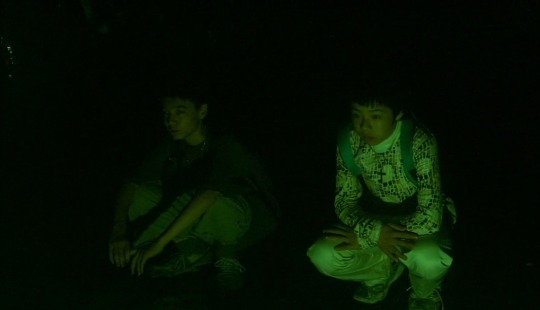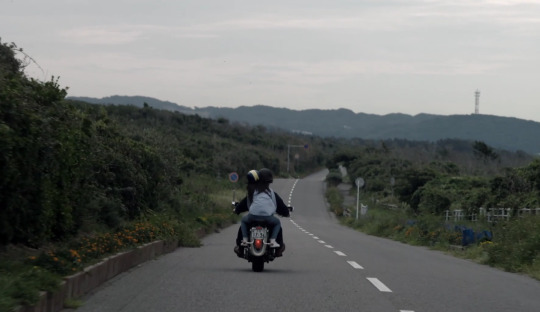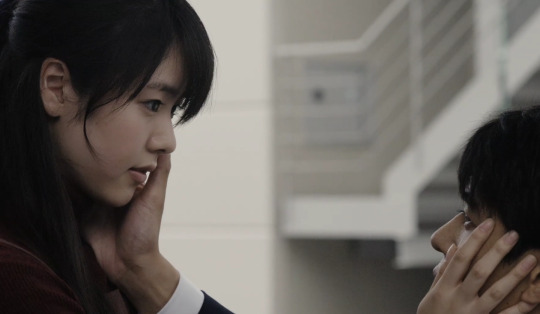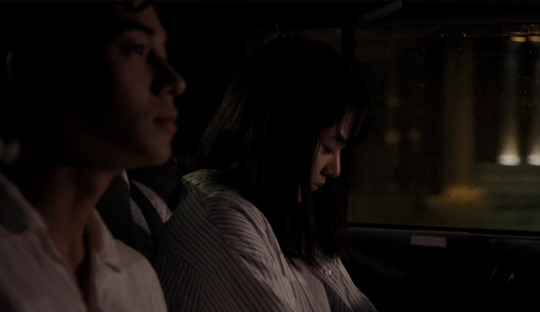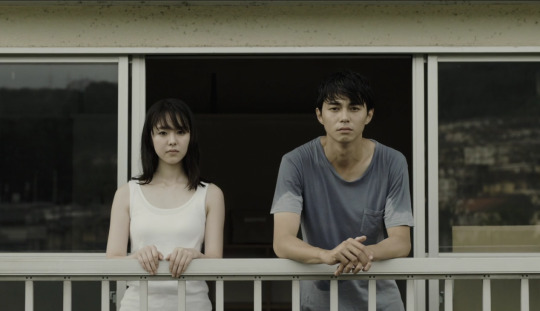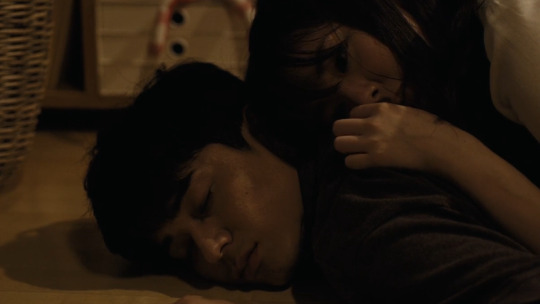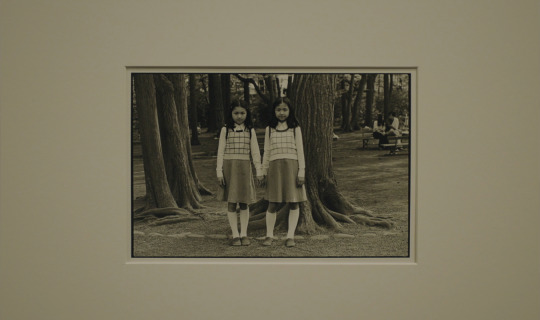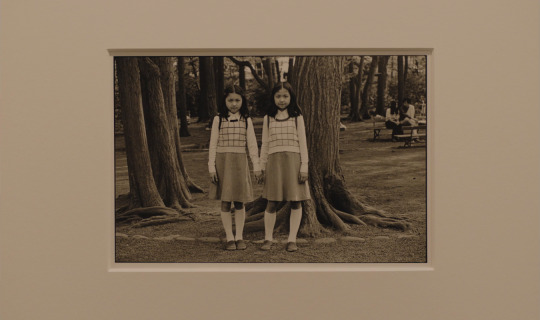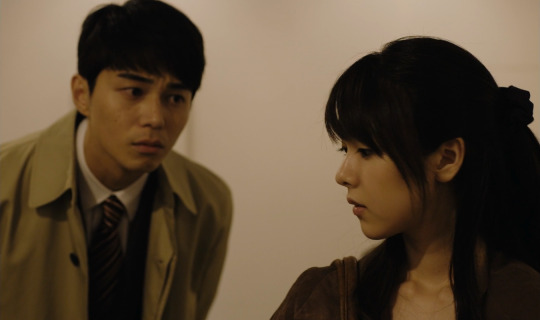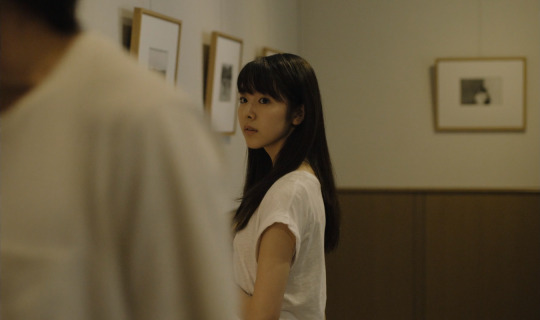Text
SUZHOU RIVER (2000)
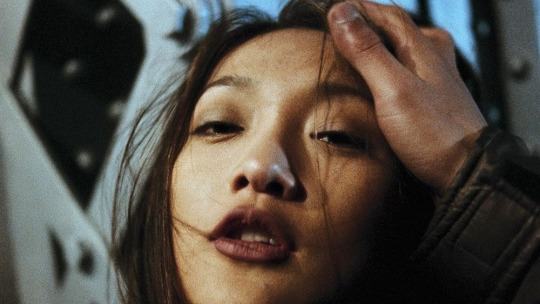
hell yeah, gorgeous movie. (i loved whatever was going on with the handheld pov shots and extreme close-ups.)
if you like mermaids, magic realism, shanghai, weird identity stuff and doppelgangers, romance, dying "romantically," young zhou xun, idk, maybe you'll like this.
if you liked this film, you might like long day's journey into night (地球最後的夜晚) (2018) or the wild goose lake (南方車站的聚會 / 南方车站的聚会) (2019). (just based on vibes i guess)
this was playing at the roxie last year (march 2023) and i didn't go, but one of my friends went. i should have gone with her.
once i went somewhere with a friend and when i went back home my mom asked me what we did and i said that we watched suzhou river (we did not watch suzhou river).
i think of this as like "asako i & ii (2018) for boys" but that's probably inaccurate.
ps: you might enjoy this translation of a chinese review of suzhou river by "a teenager who likes fapping and suzhou river" by harryblarr on letterboxd.
1 note
·
View note
Text
Interesting article: I had seen several of the films and animes it describes but never realized they fit together as a particular genre or trope. (via.)
15 notes
·
View notes
Text
Obsessed (2014) and Decision to Leave (2022)
If I had a dollar for every time a disaffected married Korean man with a respected job no longer has any love for his wife and instead falls for a mysterious Chinese woman who likes birds, I'd have two dollars, which could probably buy 1 lamb skewer in Flushing.

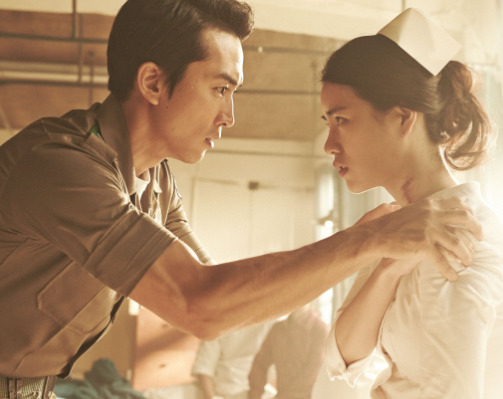
(Top: Decision to Leave, Bottom: Obsessed)
Both are heavy in symbolism, both mostly follow the perspective of the man, both have him go through an existential crisis as result of his affair, and both end in tragedy. Only one of them actually uses a Chinese actress though, Tang Wei, who is as frightening as ever. It almost seemed like her character in Lust Caution survived execution and grew to become a real killer.
What is interesting to me is that Korean media seems to regard Chinese women, and maybe Chinese people in general, with a kind of uncouthness, roughness, and danger that is nevertheless alluring and exotic. I think of how much Koreans love Twice's Tzuyu. In both these movies, the Chinese woman is looked down upon by Korean society at large, which in turn forces her under the care of exploitative men. Shunned by society externally, she becomes connected to a sensitive Korean man who begins to reject the society internally. The man becomes obsessed with the beautiful foreigner, the obsession driven by the taboo nature. Their affair (steamy or metaphorical) causes both to enter a downward spiral that ends in disaster and death. I will say, the execution of this affair is a lot better in Decision to Leave; the reason for demise is not a straightforward "heartbreak", but a more complex mutually parasitic/destructive relationship. Tang Wei's character claims she didn't truly begin to love the detective until he had violated his convictions as a law enforcer to allow her to escape justice for the crime he just solved. In contrast, Lim Ji-yeon's Chinese woman is very...passive. She resigns herself to her role in the society, though it was brave of her to refuse the colonel's final advances. Sometimes it takes courage to be unromantic.
These two subdued Chinese beauties also remind me of Shu Qi's character in "I Married A Gangster", who is a ill-tempered kungfu fighting bad b*tch who is in Korea for some reason. I didn't continue the movie after 5 minutes because the sword dance she was doing in the beginning that ended in her massacring the attending mafia felt very cringe and stereotypical.
This instance in turn brings up Detective Ma in Extreme Job, the relentless (male) cop who displays an arsenal of surprising talents, one of which is speaking Chinese (which is barely discernable to me) to a group of drug-selling Chinese gangsters.
We can go into all sorts of analysis about where these archetypes come from, but I won't do that; I'm just gonna admit it's a little fun being seen as vaguely unwholesome.
#kevin watches#decision to leave#obsessed#tang wei#hae il park#lim ji yeon#song seung heon#cho yeo jeong
7 notes
·
View notes
Text
ALL ABOUT LILY CHOU-CHOU (2001)
this film has been on my list at least since i read “On Denpa”. the essay includes a content note:
The film features violent images of bullying, suicide, and sexual abuse.
that i’d totally forgotten about by the time i watched the film (for free on kanopy). i went in expecting something lighter.
it’s good though. i want to watch it again tbh.
6 notes
·
View notes
Text






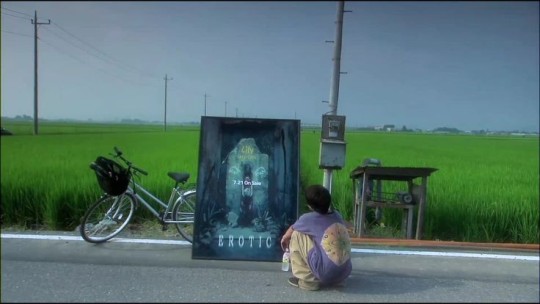



the beauty of: リリイ・シュシュのすべて (All About Lily Chou-Chou) (2001)
directed by: 岩井 俊二 (Iwai Shunji)
produced by: Koko Maeda
cinematography by: Noboru Shinoda
starring: 市原 隼人 (Ichihara Hayato), 忍成 修吾 (Oshinari Shugo), 伊藤 歩 (Itō Ayumi)
423 notes
·
View notes
Text
Clover (2014)
我回来了!
对不起大家(大家主要指我好友X小姐),进一年在工作上比较忙,回家重没精力写高质量博客。但我从没放弃这个电影评价/讨论平台,也从没放弃对亚裔电影的爱好。说起工作,咱们讲我最近看的喜剧爱情片。、
The more specific a trope, the more memorable it is. A seemingly cold, well-put together, highly competent bespectacled guy flirts/bullies a messier, plucky, strong-willed girl.
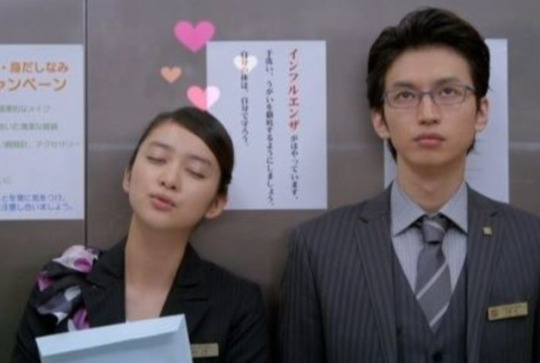
I think my friend has mentioned Clover before, or I must have seen some part of it, or maybe the vibe is just so familiar. Maybe there was an anime along similar lines? Something like the class president dating the resident gyaru? Or some wuxia show where the bumbling female mc catches the heart of the demon king?
Regardless why this dynamic feels so familiar, the particular setting of the movie being a corporate office became more and more interesting to me as the movie progressed. Saya (the girl) and Tsuge (the guy) 's love bully dynamic honestly isn't as strong as the trailer implied; the plot moves past this pretty quickly, and the main conflict is a semi love-quadilateral, with Saya and Tsuge in the middle, and Haruki (Saya's childhood love) and Shiori (Tsuge's boss' spoiled sister) pursuing them respectively. There really wasn't much question whether Saya or Tsuge would reciprocate those competitors, but whether the relationship would stand the tests of mutual insecurity, and honestly, motherfucking capitalism and toxic work culture. I'm not sure if the movie set out to say anything about the latter topics, and maybe I'm reading a lot more into it (and Japanese work culture a decade ago; damn 2014 is the last decade???) than I should, but the look into (a movie version) of a Japanese office was...elucidating.
Main thoughts:
The CEO demoting the older subordinate/midlevel manager to chauffeur for spending time with his own family. The CEO is portrayed as a huge asshole who exploits his underlings, and this was treated as a shocking moment for us and Tsuge, but what bothered me most was how the older man just went along with it cheerily. I wondered if the old man not just leaving the company is realistic in their work culture.
The entire situation of Tsuge being Saya's direct manager being portrayed as okay while Shiori being Tsuge's direct superior (kinda) being shown as exploitative/tyrannical. In-universe however, both were pretty much celebrated by the company and coworkers. I wondered if Japan had more lax workplace romance rules than the US; it was plainly obvious that both relationships affected their participants ability to perform their tasks (ok not Shiori, bc she never did any work anyways). Tsuge directly prevented Saya from making a huge blunder and covered for her; did he only do that because they were dating? Upper management would like to know...if upper management wasn't also interested in bonking him.
I noticed that most of Saya's female coworkers were around her age and also single. One funny scene was Saya's work buddy scanning the lobby of the hotel they work at and letter grading their male comrades for dateability: age, face, body, money, etc. A slew of C or below, and then Tsuge comes and is an A+. There is only one older woman, and she is also single, and mostly serves a comic relief (and a bit of a jealous gossiper). One of Saya's friends' gets married. I wondered if Saya and most of her coworkers would just leave the workforce after getting married, and if they wanted to or were expected to.
Saya and Haruki deal very differently with the trauma of being ripped away from each other in middle school; Saya swears to save herself for him forever and date nobody else, while Haruki dates around but forever feels unfulfilled, at the same time purposely not contacting Saya because "it'll make him weak". It's interesting that finally meeting each other again seems to be the impetus for both to stop the yearning. I'm glad Saya was pretty firm in rejecting Haruki after her relationship with Tsuge began, but still treated him as a good friend.

In the end, the CEO wryly states he can't afford to punish Tsuge for choosing his personal life over career this time due him being too useful. Interesting that Tsuge being so useful and hardworking, and being mostly a hardass who didn't have much time for women, was what put him in the sights of Shiori in the first place. In another less gracious version of the story, Shiori and the CEO could easily retaliate against Tsuge and especially Saya for the humiliation in a myriad of ways.
A lighthearted fun movie for most of it. I think the significance of the title is kinda...shoehorned. Saya feels finally feels lucky, but luck aint got nothing to do with it.
6 notes
·
View notes
Text
things i watched in 2022
asian film:
after life (dir. kore-eda)
爱情神话 (2021)
a brighter summer’s day (dir. edward yang)
asako i & ii (dir. hamaguchi)
inu-oh (2021) (dir. yuasa) (this was amazing, i wish i had done some kind of write-up for it while it was still fresh)
wheel of fortune and fantasy (2021) (dir. hamaguchi) (more hamaguchi bc we love hamaguchi)
days of being wild (1990) (dir. wong kar-wai)
three by naomi kawase: sweet bean (2015), still the water (2014), radiance (2017) (these were ok, kind of slow)
an autumn afternoon (dir. yasujiro ozu)
decision to leave (dir. park chan-wook) (tbh i want to see kevin write about this one)
asian-american film:
everything everywhere all at once (2022)
four samosas (dir. ravi kapoor) (another one i wish i’d done a write-up for while it was fresh)
not asian film but worth a mention:
solaris (dir. tarkovsky)
nightmare alley (2021) (dir. del toro)
mirror (dir. tarkovsky)
wonder boys (2000) (because pittsburgh)
a bunch of spider-man movies
crimes of the future (2022)
the before trilogy
black moon (1975) (weird, kind of bad; and ofc i liked it a lot)
moonage daydream (2022)
the menu (2022) & bones and all (2022) (these two go surprisingly well together as a double feature)
glass onion
remainder (2015)
also, at kevin: i see your unpublished drafts! i see them
3 notes
·
View notes
Photo
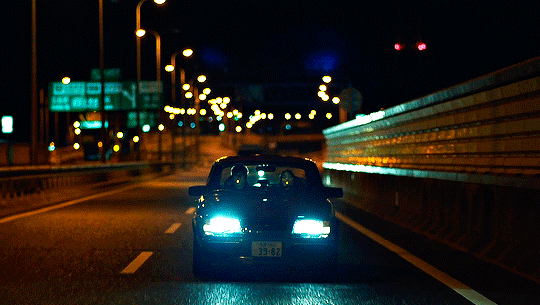
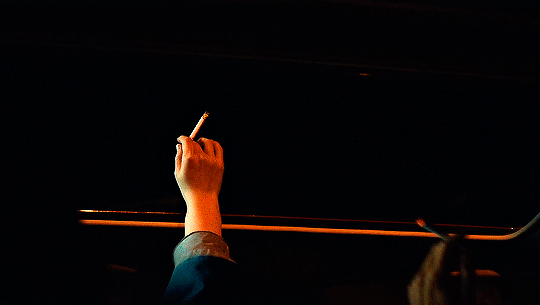

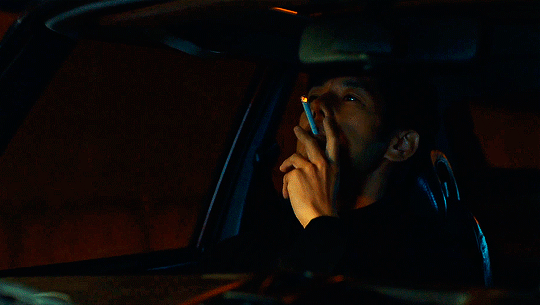

Are you sure? Yeah.
Drive My Car (2021) dir. Ryûsuke Hamaguchi
3K notes
·
View notes
Photo







We’ll live through the long, long days, and through the long nights. We’ll patiently endure the trials that fate sends our way. Even if we can’t rest, we’ll continue to work for others both now and when we have grown old. And when our last hour comes we’ll go quietly.
Drive My Car
2021 dir. Ryûsuke Hamaguchi
2K notes
·
View notes
Text
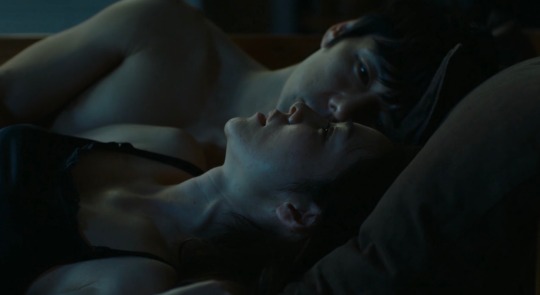
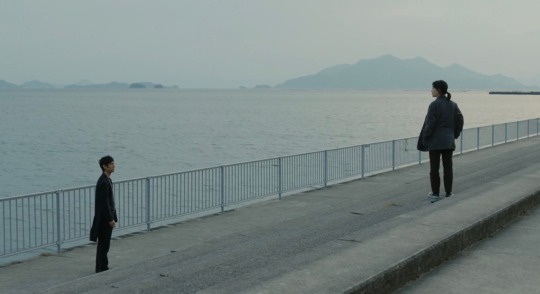
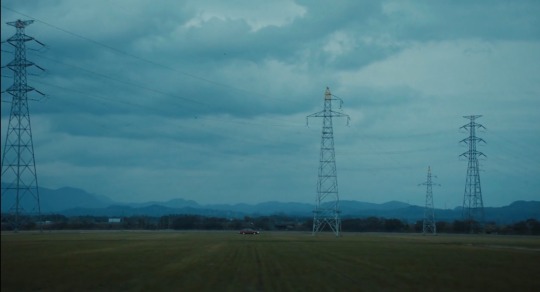

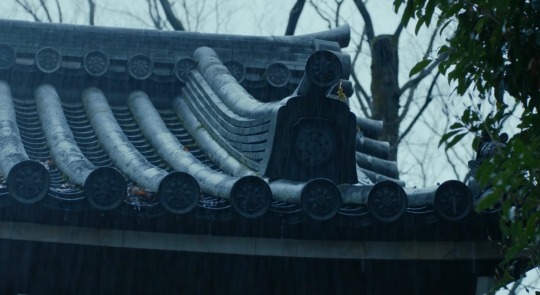





Drive My Car (2021) dir. Ryusuke Hamaguchi
“We'll live through the long, long days, and through the long nights. We'll patiently endure the trials that fate sends our way. Even if we can't rest, we'll continue to work for others both now and when we have grown old. And when our last hour comes we'll go quietly. And in the great beyond, we'll say to Him that we suffered, that we cried, that life was hard. And God will have pity on us. Then you and I we'll see that bright, wonderful, dreamlike life before our eyes. We shall rejoice, and with tender smiles on our faces, we'll look back on our current sorrow. And then at last, we shall rest. I believe it. I strongly believe it from the bottom of my heart. When that time comes, we shall rest.”
256 notes
·
View notes
Text
some films involving doubles or weird identity shit
in chronological order:
vertigo (1958)
last year at marienbad (1961)
celine and julie go boating (1974)
dead ringers (1988)
the double life of veronique (1991)
the prestige (1995)
perfect blue (1997)
mulholland drive (2001)
time (2006)
the skin i live in (2011)
the double (2013)
enemy (2013)
the one i love (2014)
what happened to monday (TV 2017)
asako i & ii (2018)
severance (TV 2022)
(note: i've seen like at most 5 of the above...)
(more in the comments on this reddit post)
28 notes
·
View notes
Text
ASAKO I & II (2018)
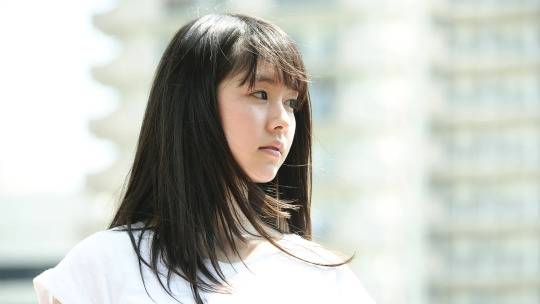
asako i & ii (寝ても覚めても, netemo sametemo, "whether asleep or awake") is a surreal romance about a woman who falls in love with two men with the same face. it was directed by ryusuke hamaguchi, who also directed drive my car.
the premise: asako (erika karata) falls in love with a mysterious young man called baku (masahiro higashide). one day, baku disappears. years later, in tokyo, asako sees him again. or, well, not him, but a young salaryman called ryohei (also masahiro higashide). they begin building a life together, until asako's past resurfaces.
(just some disorganized thoughts below. i tried to organize this but i gave up. i just want to get this out of me.)
point of view:
the first part of the movie (up to the title card, which shows up about twenty minutes in) is in asako's point of view. most of the movie is in ryohei's point of view, and then we switch back to asako's at about halfway through the movie.
asako kind of reminds me of hatsumi from the hot gimmick film adaptation. there's something opaque about them. both are quiet and innocent-looking. both of their respective films have shots of them where we view the heroine head on, eye-level, like in a mirror. both are played by young and inexperienced actresses (hot gimmick was miona hori's first feature film; asako i & ii was erika karata's second—her first came out the same year)
for asako, baku is the mystery, the manic-pixie-dream-girl-like character. for ryohei, when he first meets asako, asako is the inexplicable, confusing mystery. we know why asako is acting weird (because he reminds her of baku), but he doesn't.
the novel this is based on is entirely in first person (in asako's point of view, i think)
similarities to drive my car:
chekov
spaciousness, a slice-of-life feel
both movies are somehow both contrived and naturalistic
contrived: fate and coincidences (in this movie: the whole doppelganger scenario, the way asako and ryohei run into each other) (in drive my car: things like how the driver's age is the same as what the male lead's daughter's age would have been)
naturalistic: slow, realistic moments (in this movie: there's a shot of a side character just misting plants. the aftermath of the earthquake. also moments like asako giving ryohei a massage.) (in drive my car: the driver, misaki, waiting with a book, or leaving a grocery store...)
the title of the movie:
the japanese title and the english title are different
sleeping and waking (asako's monologue near the end of the movie)
the two asakos
which two asakos?
when is she asleep and when is she awake?
before and after baku? before and after baku comes back? before and after she comes back to ryohei?
trivia, re: names:
asako's name - asa for morning - the title "sleeping/waking"
baku's last name, torii, means "bird" - he might fly away at any moment
appearance, the body:
supporting character haruyo's plastic surgery
identity and how much of your identity is your body and how you look
the superficiality of attraction
how weird it must feel to think that someone might like you just for your face (even though that's not at all the case for ryohei and asako)
i was reading denial of death, and it said a lot of stuff about the body, and how people don't want to be just their bodies, because being your body means death, because your body will die... and how ryohei doesn't want to just be reduced to his (baku-like) face.
dreams vs reality, the other vs the mundane, baku and ryohei as representatives, magical realism:
we don't understand why asako likes baku. except i want to say that it's not female hypergamy. or it's not just female hypergamy. can we acknowledge that people do things because they're human and have human weaknesses, but also because of like... idk, special personal reasons? i think asako has plenty of special personal reasons for her weird behavior. even if we aren't explicitly told about them.
baku as a manic pixie dream girl like character. (catalyst for asako's ... change?)
love as a curse on asako.
baku doesn't feel human sometimes. he seems like. like a fairy maybe. manic pixie dream guy. the way he suddenly disappears and reappears. the detached, nonchalant way he speaks. baku is like a dream. there's an unreality to him. the scenes where asako and baku are together... similarly don't feel real, and have a dreamlike quality to them. the whole entire intro scene (the eighteen minutes before the title card) with baku seems like a flashback. the slow-motion in some scenes, the music.
there's this sense of inequality almost? like how haruyo says that asako isn't the kind of woman someone would fall in love with at first sight. and yet asako immediately, with baku, falls in love at first sight. how baku will leave at any time and asako will be waiting for him to come back. how asako is shown as... chasing after him. sometimes? like he's there, unseeable and unknowable, and asako's unable to reach him. also foreshadowing of asako's abandonment by baku (haruyo saying baku is a heartbreaker, etc).
the abandonment is an open loop (open wound?)
ryohei is a real guy. we know him better than we know baku. we see asako's life with him. their shared time and shared efforts. their domestic life, their cat, the massage asako gives ryohei when they come home late at night.
ryohei speaks in kansai dialect (stereotype of immediacy, honesty), baku speaks in standard tokyo dialect (despite being from osaka) (distance, aloofness)
asako only really comes to terms with baku's disappearance when ryohei appears in her life.
asako seeks closure
the cat that asako and ryohei have. the cat as a symbol for their relationship.
on one hand, asako only falls in love with ryohei because he looks like baku. on the other hand, in an atemporal and acausal way, maybe asako only fell in love with baku so that she could fall in love with ryohei later.
asako running after people (men) or cats
the asako who is asleep, the asako who has woken up
asako is only able to truly choose ryohei after she's "awake"
random stuff:
the way the camera tracks feet walking, characters moving
there's a random scene where a sheet falls on baku and asako (in the beginning, honeymoon phase) and they kiss under it, like the lovers by magritte.
self and others - that's the name of the photography exhibition where she meets baku. and the photography exhibition that ryohei helps asako and maya get into, before asako and ryohei get to know each other. there's this really striking parallel where asako is looking at a certain photo, and baku or ryohei appear beside her in frame.
pregnancy and birth motif / revelation of the truth
doppelgangers, identical strangers
cell phones as a recurring element (breaking up via phone call, throwing away your phone to cut off communication, etc)
waking, sleeping
maya and kushihashi, talking about chekov and acting... "everybody does that" - everybody uses the audience to be the center of attention
2011 tohoku earthquake. a big part of asako and ryohei's relationship. i think the earthquake wasn't in the novel (because it hadn't yet happened when the novel was published in 2010)
8 notes
·
View notes
Text
DRIVE MY CAR (2021)
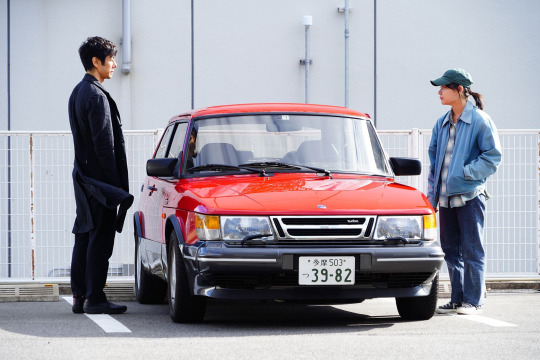
a spacious and refreshing film. three hours long but not slow.
watch it (with a friend? a lover?) when it comes to town
fun facts (not spoilery at all):
the murakami story this is adapted from (same title, the first story in men without women) was probably named after a beatles song...what is it with murakami and the beatles...
this film contains at least four different languages, including korean sign language
this film was supposed to be filmed in busan but they ended up filming in hiroshima instead
the steering wheel of the titular car is on the right, not the left
here’s a drinking game (or popcorn-eating game, for a non-alcoholic equivalent) (also not spoilery at all).
drink (or eat popcorn) whenever:
the main character says “OK” (dangerous)
the main character is addressed by his given name (safe)
a character drapes a blanket or such over another character (safe)
a character removes a fake moustache onscreen (safe)
a photograph is taken (safe)
the driver puts her hands in her pockets (dangerous)
things to look into after this movie if you enjoyed it:
chekov’s play Uncle Vanya
korean sign language
the film Asako I & II
16 notes
·
View notes

